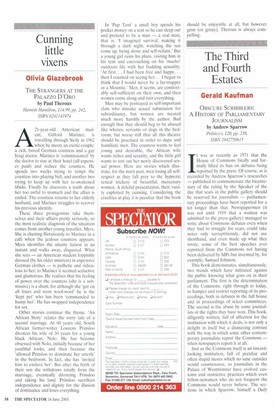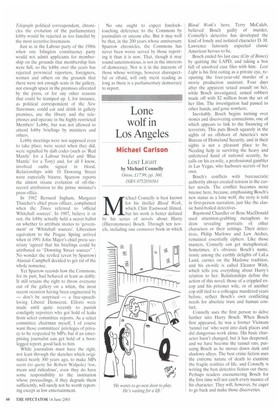The Third and Fourth Estates
Gerald Kaufman
OBSCURE SCRIBBLERS: A HISTORY OF PARLIAMENTARY JOURNALISM by Andrew Sparrow Politico's, £20, pp. 238, ISBN 1842750615 1 t was as recently as 1971 that the House of Commons finally and formally lifted its ban on debates being reported by the press. Of course, as is recorded by Andrew Sparrow's researches — published to commemorate the bicentenary of the ruling by the Speaker of the day that seats in the public gallery should be reserved for journalists — parliamentary proceedings have been reported for a lot longer than that. Newspapermen (it was not until 1919 that a woman was admitted to the press gallery) managed to write about Commons debates even when they had to struggle for seats, could take notes only surreptitiously, did not use shorthand, and even made up what they wrote, some of the best speeches ever reported from the Commons not having been delivered by MPs but invented by, for example, Samuel Johnson.
This book demonstrates, simultaneously, two trends which have militated against the public knowing what goes on in their parliament. The first is the determination of the Commons, right through to today, to hamper and restrict reporting of its proceedings, both in debates in the full house and in proceedings of select committees. The second is the abuse by some journalists of the rights they have won. This book, diligently written, full of affection for the institution with which it deals, is not only a delight in itself but a dismaying contrast with the way in which some other contemporary journalists report the Commons — when newspapers report it at all.
Just as the Commons itself is an inwardlooking institution, full of peculiar and often stupid mores which no sane outsider would countenance, so journalists in the Palace of Westminster have evolved customs and restrictive practices which even fellow-newsmen who do not frequent the Commons would never believe. The sections in which Sparrow, himself a Daily
Telegraph political correspondent, chronicles the evolution of the parliamentary lobby would be rejected as too fanciful by the most secretive freemason.
Just as in the Labour party of the 1980s when one Islington constituency party would not admit applicants for membership on the grounds that membership lists were full, so the lobby over the years has rejected provincial reporters, foreigners, women and others on the grounds that there were not enough seats in the gallery, not enough space in the premises allocated by the press, or for any other reasons that could be trumped up. I, for instance, as political correspondent of the New Statesman. could eat and drink in gallery premises, use the library and the telephones and operate in the highly restricted Members' Lobby, but was not allowed to attend lobby briefings by ministers and others.
Lobby meetings were not supposed even to take place, were secret when they did, were signalled by daft codes (such as 'Red Mantle' for a Labour briefer and 'Blue Mantle' for a Tory) and, for all I know, involved oaths signed in blood. Relationships with 10 Downing Street were especially bizarre. Sparrow reports the almost insane evolution of off-therecord attribution to the prime minister's press office.
In 1982 Bernard Ingham, Margaret Thatcher's chief press officer, complained when the Times referred to 'official Whitehall sources'. In 1987, believe it or not, the lobby actually held a secret ballot on whether to attribute stories to 'government' or 'Whitehall sources'. Liberation equivalent to the Prague Spring arrived when in 1991 John Major's chief press secretary 'agreed that his briefings could be attributed to "Downing Street sources" '. No wonder the reviled (even by Sparrow) Alastair Campbell decided to get rid of the whole nonsense.
Yet Sparrow records how the Commons, for its part, had behaved at least as daftly. It still retains the right to throw everyone out of the gallery on a whim, the most recent occasion having been engineered by — don't be surprised — a free-speechloving Liberal Democrat. Efforts were made until quite recently to punish condignly reporters who got hold of leaks from select committee reports. As a select committee chairman myself, I of course want those committees' privileges of privacy to be respected by MPs; but if an enterprising journalist can get hold of a bootlegged report, good luck to him.
While journalists must have the right, not least through the sketches which originated nearly 300 years ago, to make MPs seem (to quote Sir Robert Walpole) low, mean and ridiculous', even they do have some responsibility to the institution whose proceedings, if they degrade them sufficiently, will surely not be worth reporting except as low entertainment. No one ought to expect forelocktouching deference to the Commons by journalists or anyone else. But it may well be that, in the 200 years whose anniversary Sparrow chronicles, the Commons has never been worse served by those reporting it than it is now. That, though it may sound sanctimonious, is not in the interests of democracy. Nor is it in the interests of those whose writings, however disrespectful or ribald, will only merit reading as long as there is a parliamentary democracy to report.



































































































 Previous page
Previous page